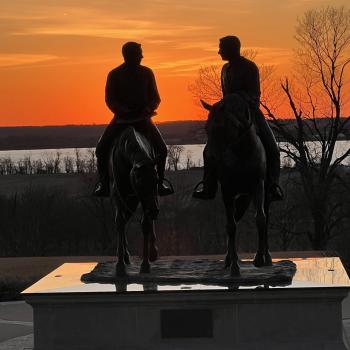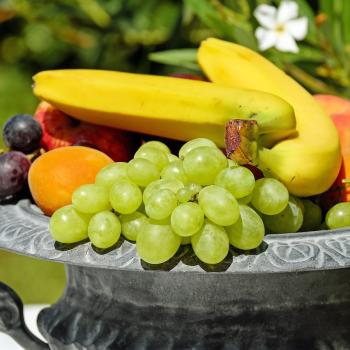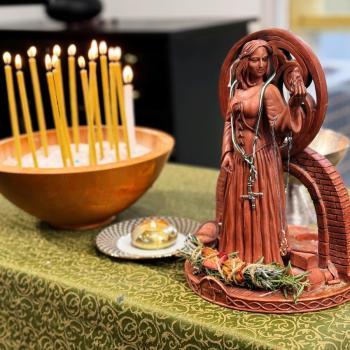Youth is a natural time in which to have lots of questions and to explore and experiment. Actively doing so should probably not stop until sometime in one's mid-twenties, I think, and yet the deliberate commitment to long-term involvement in a variety of causes, interests, groups, and identities earlier on—whether that means as a teenager (or, in some cases, even younger) or once one leaves high school—is also to be lauded and respected when it does occur. Many of us discovered modern Paganism while we were teenagers, and have been continuing with it ever since; that was my own situation when I was fifteen. Sexual orientation and gender identity used to be things that generally didn't get expressed or explored until one got to college, but now kids as young as eight are coming out as transgendered, and to hear of children who are known to be gay before they are teenagers is also far more widespread than it used to be. Many older queer people recall having such notions at those young ages, but not having the vocabulary to express them or much of an understanding of them—I know this was true in my own case back to about age four. Tremendous strides in visibility and education have occurred on these matters, which has made it possible for the first time in post-Christian Western culture for children to identify themselves in these ways without fear of immediate censure, correction, or punishment (though these still happen far more often than they should).If we are entering a world in which children know these things about their gender and sexual identities that early, then our religions should be able to respond appropriately to those concerns. But, how?
I don't have any definite answers on this question, but it is a concern of mine, and one that has been particularly acute for the past two years, especially since the spate of publicly acknowledged youthful suicides that took place in the latter half of 2010 (though suicide amongst LGBTQ people, including youths, has always been much higher than it is in the general population).I am hoping that some of my concerns on this matter will be addressed by a session that the Ekklesía Antínoou will be holding at PantheaCon 2012 in San Jose in February, in which we will not only present what we have to offer, and attempt to address some of the challenges which face modern queer youths that are different from those which older people faced, but in which we will be actively attempting to engage with the concerns of queer youth and do what we can to meet their particular needs when they have voiced them. I look forward to that occasion very much indeed.
However, I do have some closing thoughts that I think might be useful to consider for anyone who is a modern Pagan parent. It is entirely possible that one or more of your children might end up being lesbian, gay, bisexual, transgendered, or queer in some sense or other; there is probably nothing you can do about this, and under no circumstances should you feel that you've "done something wrong" or that this is in any way a detriment to you or the children concerned. It is also entirely possible (and preferable, and laudable!) that you are as loving, accepting, and affirming of their identity as it can be for you to be. Do not stint in loving and accepting your queer Pagan children, by any means. But, love and acceptance may not be enough to fully empower them in their identity or their future spiritual practice and personal development. If you have queer Pagan friends or family members who can advise you, or directly mentor your children, in these particular matters, that is certainly a great thing.
However, it would also be good to familiarize yourself with some of the groups, practices, deities, and histories of queer people and queer Pagan traditions so that you can foster your queer Pagan children's future, integrated spiritual development. And, it may even be useful for you to develop cultus that integrates some of the deities which are part of that queer Pagan spiritual heritage which you can teach to your children and in which you can include them. Indeed, the myths of many deities already include some incidents which could be considered queer, gender-variant, or homoerotic in some fashion or other. Never underestimate the power that even the fewest number of words on this matter can do for a child who may be feeling exclusion at school and uncertainty with society in general because of their own developing sense of queer identity.I f you honor Zeus as the father of gods and men, for example, make sure that you also say that he was a lover of men...and so was Poseidon, and Apollon, and Hermes, and Herakles, and many others. If you honor Artemis of Ephesus, do not forget the story of Kallisto; if you honor Brigid (Imbolc is coming up, after all!), familiarize yourself as well with the story of Darlugdach, who shared Brigid's festival day.
While queer people generally speaking enjoy being around "their people" a great deal, something that would help us out in so many ways would be for situations in our wider existence to not only be affirming and accepting (and not merely "tolerant") of our queer identities, but to see non-queer people honoring and acknowledging our histories and traditions. The gods are multi-faceted and complex beings, and making your children aware of this diversity in terms of gender and sexuality will do them worlds of good if they are gender-and sexually-diverse themselves. The gods have thus far identified no barriers between their own genders and sexual orientations and their involvement with humans who are not of those same genders or sexual orientations; the same should be true of humans in relation to the gods and their involvement with and cultus to them. Especially if one is a Pagan parent—whether your children are queer or not—demonstrating your affirmation of the diversity of humanity through acknowledgement and honoring of the same types of diversity in the realm of divine beings is one of the most powerful and effective means of giving your children a positive example to uphold in their own future maturity.





